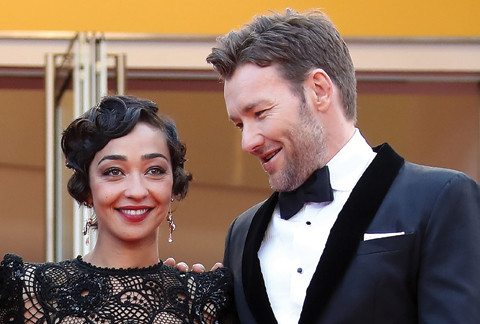 This file photo taken on May 16, 2016 shows Irish-Ethiopian actress Ruth Negga (L) and Australian actor Joel Edgerton as they arrive for the screening of the film ‘Loving’ at the 69th Cannes Film Festival in Cannes, southern France. — AFP
This file photo taken on May 16, 2016 shows Irish-Ethiopian actress Ruth Negga (L) and Australian actor Joel Edgerton as they arrive for the screening of the film ‘Loving’ at the 69th Cannes Film Festival in Cannes, southern France. — AFP
Just as a caustic election has laid bare loose threads in the US social fabric, a new film has returned to the country's all-too-recent era of deep racial segregation. "Loving"-which entered wide release in time for the US Thanksgiving holiday-follows the romance of a black woman and a white man in mid-20th century America, when laws in some states forbade interracial marriages.
The historical drama is based on a decade-long legal battle that culminated in a landmark Supreme Court decision, declaring unconstitutional legislation banning interracial marriage, known as anti-miscegenation laws.
After they wed in Washington DC, Richard and Mildred Loving returned to the US state Virginia-part of the secessionist confederacy during the Civil War -- where marrying across the racial divide was forbidden.
Childhood sweethearts, Richard and Mildred wanted little more than to build a home-but in the eyes of Virginia law, the lovers were criminals. The Lovings ultimately found themselves on the front lines of a civil rights case that would change the course of US history. Half-a-century later, the 1967 ruling's impact is still reverberating: the historic judgment helped pave the way toward legalizing gay marriage in 2015.
The right to love
Not long after the Lovings exchanged vows in Washington in 1958, police raided their home in the dead of the night. Mildred, who was pregnant, hoped the marriage certificate on the wall would shield the pair from arrest, to no avail. "That's no good here," the sheriff told her, before arresting the pair.
The couple pleaded guilty in Virginia court and received a one-year prison sentence. The punishment was suspended for 25 years on the condition that the Lovings leave the state, so they returned to Washington.
The film, which received critical acclaim following its premiere at Cannes, stars Joel Edgerton and Ruth Negga whose portrayal of Mildred Loving has her tipped as a possible Oscar nominee. The lead actors portray the couple not as militants or intellectuals, but as a shy, working-class pair determined to defend their right to love. "Tell them I love my wife," Richard tells his lawyer, when asked what he would like the Supreme Court to know.
Unsung heroes
A couple whose primary aim was to leave the city and return to a life under the radar in their home state, Richard and Mildred Loving are relatively unsung heroes of the civil rights movement.
"Civil rights organizations and their allies never made reversal of the anti-miscegenation laws a major cause," historian Larry Greene of Seton Hall University told AFP, saying that housing, school desegregation and voting rights were instead the top priorities. And yet the US has a long history of barring interracial marriage, according to Robin Lenhardt, a law professor at Fordham University.
Anti-miscegenation laws existed in 30 states at one point, she said, which many people saw "as a crucial dividing line between whites and blacks, crucial to the society. "For that to be removed was a bitter pill for many communities." Some states resisted the 1967 ruling: Alabama did not overturn its legislation outlawing interracial marriage until 2000, the last state to do so.
The film has been released at a time, Lenhardt said, "when the nation is thinking and worrying about racism."
Since Donald Trump's election hate speech has been on the rise, according to the Southern Poverty Law Center, which seeks to track and combat racism. And the past summer saw a string of high-profile police shootings of black citizens that inflamed racial tensions nationwide. "The film is a reminder of the need to guard against the kind of racial bias that we've seen in the distant past," Lenhardt said, "but also our recent."-AFP

